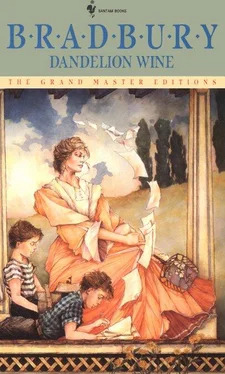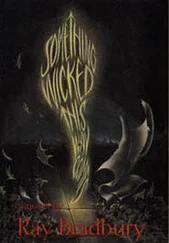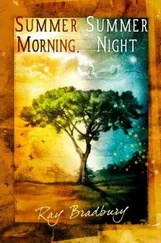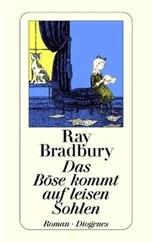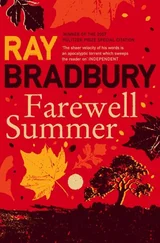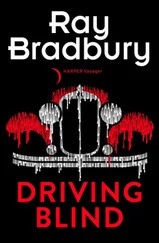He lifted one bottle into the light.
“‘GREEN DUSK FOR DREAMING BRAND PURE NORTHERN AIR,’ he read. ‘derived from the atmosphere of the white Arctic in the spring of 1900, and mixed with the wind from the upper Hudson Valley in the month of April, 1910, and containing particles of dust seen shining in the sunset of one day in the meadows around Grinnell, Iowa, when a cool air rose to be captured from a lake and a little creek and a natural spring.’
“Now the small print,” he said. He squinted. “‘Also containing molecules of vapor from menthol, lime, papaya, and watermelon and all other water-smelling, cool-savored fruits and trees like camphor and herbs like wintergreen and the breath of a rising wind from the Des Plaines River itself. Guaranteed most refreshing and cool. To be taken on summer nights when the heat passes ninety.’”
He picked up the other bottle.
“This one the same, save I’ve collected a wind from the Aran Isles and one from off Dublin Bay with salt on it and a strip of flannel fog from the coast of Iceland.”
He put the two bottles on the bed.
“One last direction.” He stood by the cot and leaned over and spoke quietly. “When you’re drinking these, remember: It was bottled by a friend. The S. J. Jonas Bottling Company, Green Town, Illinois—August, 1928. A vintage year, boy . . .a vintage year.”
A moment later there was the sound of reins slapping the back of the horse in the moonlight, and the rumble of the wagon down the street and away.
After a moment Douglas’s eyes twitched and, very slowly, opened.
“Mother!” whispered Tom. “Dad! Doug, it’s Doug! He’s going to be well. I just went down to check and come on!”
Tom ran out of the house. His parents followed.
Douglas was asleep as they approached. Tom motioned to his parents, smiling wildly. They bent over the cot.
A single exhalation, a pause, a single exhalation, a pause, as the three bent there.
Douglas’s mouth was slightly open and from his lips and from the thin vents of his nostrils, gently there rose a scent of cool night and cool water and cool white snow and cool green moss, and cool moonlight on silver pebbles lying at the bottom of a quiet river and cool clear water at the bottom of a small white stone well.
It was like holding their heads down for a brief moment to the pulse of an apple-scented fountain flowing cool up into the air and washing their faces.
They could not move for a long time.
The next morning was a morning of no caterpillars. The world that had been full to bursting with tiny bundles of black and brown fur trundling on their way to green leaf and tremulous grass blade, was suddenly empty. The sound that was no sound, the billion footfalls of the caterpillars stomping through their own universe, died. Tom, who said he could hear that sound, precious as it was, looked with wonder at a town where not a single bird’s mouthful stirred. Too, the cicadas had ceased.
Then, in the silence, a great sighing rustle began and they knew then why the absence of caterpillar and abrupt silence of cicada.
Summer rain.
The rain began light, a touch. The rain increased and fell heavily. It played the sidewalks and roofs like great pianos.
And upstairs, Douglas, inside again, like a fall of snow in his bed, turned his head and opened his eyes to see the freshly falling sky and slowly slowly twitch his fingers toward his yellow nickel pad and yellow Ticonderoga pencil . . .
There was a great flurry of arrival. Somewhere trumpets were shouting. Somewhere rooms were teeming with boarders and neighbors having afternoon tea. An aunt had arrived and her name was Rose and you could hear her voice clarion clear above the others, and you could imagine her warm and huge as a hothouse rose, exactly like her name, filling any room she sat in. But right now, to Douglas, the voice, the commotion, were nothing at all. He had come from his own house, and now stood outside Grandma’s kitchen door just as Grandma, having excused herself from the chicken squabble in the parlor, whisked into her own domain and set about making supper. She saw him standing there, opened the screen door for him, kissed his brow, brushed his pale hair back from his eyes, looked him straight on in the face to see if the fever had fallen to ashes and, seeing that it had, went on, singing, to her work.
Grandma, he had often wanted to say, Is this where the world began? For surely it had begun in no other than a place like this. The kitchen, without doubt, was the center of creation, all things revolved about it; it was the pediment that sustained the temple.
Eyes shut to let his nose wander, he snuffed deeply. He moved in the hell-fire steams and sudden baking-powder flurries of snow in this miraculous climate where Grandma, with the look of the Indies in her eyes and the flesh of two firm warm hens in her bodice, Grandma of the thousand arms, shook, basted, whipped, beat, minced, diced, peeled, wrapped, salted, stirred.
Blind, he touched his way to the pantry door. A squeal of laughter rang from the parlor, teacups tinkled. But he moved on into the cool underwater green and wild-persimmon country where the slung and hanging odor of creamy bananas ripened silently and bumped his head. Gnats fitted angrily about vinegar cruets and his ears.
He opened his eyes. He saw bread waiting to be cut into slices of warm summer cloud, doughnuts strewn like clown hoops from some edible game. The faucets turned on and off in his cheeks. Here on the plum-shadowed side of the house with maple leaves making a creek-water running in the hot wind at the window he read spice-cabinet names.
How do I thank Mr. Jonas, he wondered, for what he’s done? How do I thank him, how pay him back? No way, no way at all. You just can’t pay What then? What? Pass it on somehow, he thought, pass it on to someone else. Keep the chain moving. Look around, find someone, and pass it on. That was the only way . . .
“Cayenne, marjoram, cinnamon.”
The names of lost and fabulous cities through which storms of spice bloomed up and dusted away.
He tossed the cloves that had traveled from some dark continent where once they had spilled on milk marble, jackstones for children with licorice hands.
And looking at one single label on a jar, he felt himself gone round the calendar to that private day this summer when he had looked at the circling world and found himself at its center.
The word on the jar was RELISH.
And he was glad he had decided to live.
RELISH! What a special name for the minced pickle sweetly crushed in its white-capped jar. The man who had named it, what a man he must have been. Roaring, stamping around, he must have tromped the joys of the world and jammed them in this jar and writ in a big hand, shouting, RELISH! For its very sound meant rolling in sweet fields with roistering chestnut mares, mouths bearded with grass, plunging your head fathoms deep in trough water so the sea poured cavernously through your head. RELISH!
He put out his hand. And here was—SAVORY.
“What’s Grandma cooking for dinner tonight?” said Aunt Rose’s voice from the real world of afternoon in the parlor.
“No one knows what Grandma cooks,” said Grandfather, home from the office early to tend this immense flower, “until we sit at table. There’s always mystery, always suspense.”
“Well, I always like to know what I’m going to eat,” cried Aunt Rose, and laughed. The chandelier prisms in the dining room rang with pain.
Douglas moved deeper into pantry darkness.
“Savory . . .that’s a swell word. And Basil and Betel. Capsicum. Curry. All great. But Relish, now, Relish with a capital R. No argument, that’s the best.”
Trailing veils of steam, Grandma came and went and came again with covered dishes from kitchen to table while the assembled company waited in silence. No one lifted lids to peer in at the hidden victuals. At last Grandma sat down, Grandpa said grace, and immediately thereafter the silverware flew up like a plague of locusts on the air.
Читать дальше
